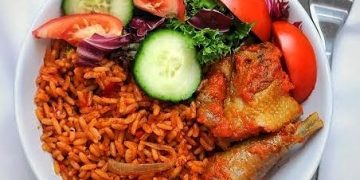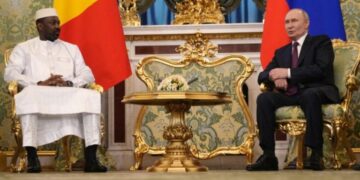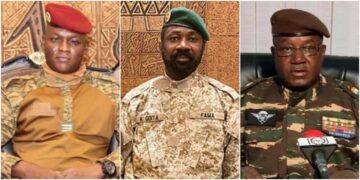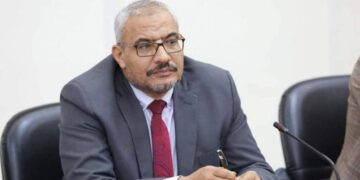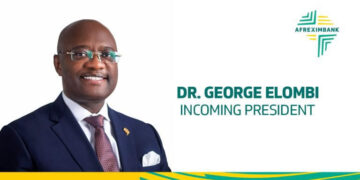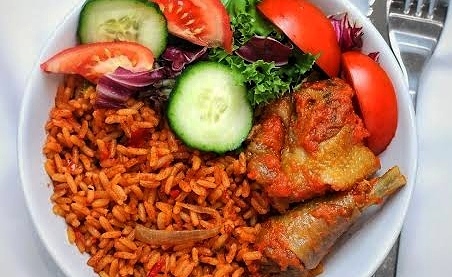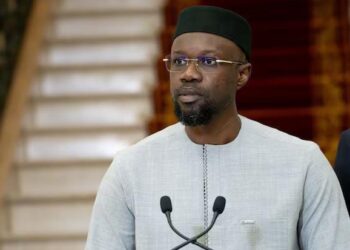By Olusegun Adeniyi
I have it on good authority that the ‘West African Jollof Rice Competition’ has long been concluded at the ‘Virtual Olympics’. From available records, Nigeria took the gold medal in all the varieties. But my Ghanaian friend, Mustapha Sanah (HRH Dalun-Lana Tapha Mahamadu II) will never agree to this. Shortly before I left Abuja for Accra last week Wednesday, I sent Mustapha a message: “Just finished preparing my Jollof rice to bring for you so that you can enjoy the Nigerian delicacy.” The response from the former Northern Development and Democratic Institute (NDDI) chairman was instant: “Don’t bother with Nigerian Jollof. You are coming to Accra, the Jollof capital of Africa.”
While the online rivalry between Nigeria and Ghana as to who cooks the best Jollof rice continues, there are more pressing challenges for the two countries. That was the main takeaway from my encounter with former President John Dramani Mahama last Friday in Accra. The candidate of the main opposition National Democratic Coalition (NDC) for the December 7 election in Ghana had just returned home from campaigning and was clearly exhausted when he hosted me. But our interaction confirmed my understanding that Ghana’s coming election is very consequential for the country and sub-region. Incidentally, the election mirrors the upcoming November 5 contest in the United States. In Ghana, Mahama (who was president between 2012 and 2016) is contesting against the incumbent Vice President Mahamudu Bawumia of the ruling New Patriotic Party’s (NPP). But how did I get to Ghana?
For the past three years, Mustapha has been ‘harassing’ me to visit. I missed his coronation last year when he was enskinned the Chief of Dalun by Ya-Na Abukari Mahama II. But having visited me in Abuja earlier this year, I just had to reciprocate. And the prospect of feeling the ground ahead of the December 7 presidential election provided the greater incentive for my visit. On arrival in Accra, I was received by his emissary and brother, Alhaji Kamil. By last Thursday morning, we took the one-hour flight to Tamale, the capital of Ghana’s Northern Region and the country’s third largest city, where Mustapha was waiting. Of course, our real destination was Dalun, a 25-minute drive from Tamale where I saw him hold court among his people as their paramount ruler.
It was my first time in northern Ghana which bears a number of similarities to northern Nigeria, especially in terms of culture, level of development (when compared with the south) and religion—the people are predominantly Muslim. But they do not have the kind of security challenge we grapple with in Northern Nigeria. In fact, the whole of Ghana is a relatively secure country. Before I eventually left Tamale with Mustapha, we visited the respected 88-year-old statesman and politician from the region, Alhaji Ibrahim Mahama who happens to be an uncle to the former president. A 1965 law graduate from the University of Ghana who was appointed Commissioner for Secretariats and Departments two years later, the elder Mahama is a living encyclopedia on the nation. He is also a former lawmaker, having been elected in 1969 to represent the Tamale constituency in the first parliament during Ghana’s Second Republic.
I had an interesting conversation with the witty old man, an author of three books, copies of which he autographed for me. The first, ‘History of Dagbon and Dangomba’ is about people and cultures in northern Ghana while the second, ‘The Destiny of a Horse Boy’ is an autobiography which weaves the story of his life with that of pre-independent Ghana. But perhaps the most insightful of the three books is ‘Murder of an African King: Ya-na Yakubu II’. In the book, Mahama traced the circumstances that led to the 2002 murder of a First-Class monarch in Northern Ghana. By his riveting account, the murder could be located in the attempts to subvert the rotational succession system between two branches of the Dagbon royal family: Abudu and Andani. It was the bid to manipulate the process and the ensuing palace intrigues that set in motion a train of events that eventually culminated in the murder of the monarch.
Before Mustapha and I left the elder statesman, an appointment had been sought and secured for me to see his nephew, the former president (and NDC presidential candidate) in Accra the next day. A former member of Ghana’s Parliament who had also served as a Minister, the younger Mahama was vice president when his principal, John Atta Mills died in July 2012. He thus became president the same way President Goodluck Jonathan assumed power in Nigeria in 2010. In December 2012, Mahama contested to be the president of Ghana and won. Four years later in 2016, he sought a second term and was defeated by the incumbent President Akuffo-Addo of the NPP. Although Mahama lost again in 2020, his party (NCC) took 31 parliamentary seats from the ruling NPP. With both parties winning the same number of seats (137 each) resulting in a hung parliament, the lone independent candidate, Andrew Asiamah Amoako supported the NDC candidate, Alban Sumana Kingsford Bagbin, who was elected speaker. So, while Akuffo-Addo of NPP is president, Mahama’s NDC controls the parliament. That provides the background to the coming election in December.
Meanwhile, a day before my arrival in Ghana, thousands of NDC supporters had embarked on a nationwide protest, demanding forensic audit of the country’s voter register which they claim contains significant discrepancies that could affect the outcome of the elections in December. “We have identified 50,000 dead people on the register, and the possibility of voting by proxies for these individuals in the future is very real,” the NDC director of elections, Edward Omane Boamah, claimed while seeking a parliamentary probe into the alleged discrepancies which include illegal name transfers and missing voters. Their presidential candidate shares the same view. “Many registered voters could not find their names, while others have had their names transferred without their knowledge,” Mahama himself told me last Friday.
But both the Electoral Commission (EC) chairman, Jean Adukwu Mensa and the incumbent President Nana Akufo-Addo have dismissed the allegations. In a message on X (formerly Twitter) last week, the commission assured Ghanaians that its register is “robust and credible”, dismissing the opposition’s allegations as baseless. “Ignore assertions that the voters’ register is not fit for the 2024 elections,” the EC posted. Addressing a religious gathering on 29 August, President Akufo-Addo also allayed fears of manipulation. “Rigging is not part of the NPP’s DNA. We are committed to conducting the upcoming election in an atmosphere of peace and security, enforcing transparency and respect for the electoral laws of our country,” the president said. “Those bent on raising the spectre of election rigging will be disappointed.”
Mahama, of course, is taking the presidential assurance with a pinch of salt. “If the EC has nothing to hide, why are they afraid of an exercise that would guarantee transparency, especially since voters’ register has been audited before in the past? In 2016 following allegations like this, a five-man committee was established to resolve the issues,” Mahama said while arguing that the electoral body is creating doubts about its impartiality. “I was in Liberia for their election and when a similar issue arose, it was resolved with an independent audit. When there are doubts about the integrity of electoral process, an independent body is needed to resolve them.”
Notwithstanding his position on the voter register, Mahama is upbeat that he will win the December election because he believes when his record in office is contrasted with that of the current administration, Ghanaians have an easy choice to make. “Ghana has lost its position as the second largest economy in West Africa to Cote D’Ivoire. Until this administration, Ghana used to be second after Nigeria,” Mahama said while reeling out the decisions taken by the current administration that have impacted negatively on the economy. “We have a debt crisis; investors have lost the confidence in our country with many businesses either leaving Ghana for other countries or shutting down completely.”
Mahama cited the example of the cocoa industry which he said has been grossly mismanaged, leaving many of the farmers frustrated. “With their excessive borrowings, they have destroyed the cocoa industry, just as they have done with the oil and gas sector”, said Mahama. “Rather than new investment what you have now is divestment. In fact, because of the toxic environment they have created, we have the worst FDI in recent history. They keep taxing the people, while borrowing heavily. They cannot even borrow again. Ghana has one of the worst inflations in the world.”
If the situation is as bad as painted, how would Mahama govern if he wins? Change, according to him, will create a new beginning. “Our policies will encourage new businesses, restore investors’ confidence, reduce recurrent expenditure and stablise economy.” He specifically stated that he will grant incentives to revive the cocoa industry. “How can we assist farmers? Water is important so for small scale farmers, we will help with boreholes and other inputs like fertilizer.”
An interesting prelude to the election occurred last Friday at the Electoral Commission’s office where agents of all the 13 candidates (ten parties and three independents) competed for positions on the ballot paper. At the end of the lottery exercise, the ruling NPP picked the first spot for Bawumia while the main opposition NDC picked number 8 for Mahama. Trust politicians, supporters of Bawumia are already making a song and dance about their luck in picking the number one slot on the ballot paper.
However, beyond being candidate of the ruling party and current vice president, Bawumia has impeccable credentials. A former banker and author of several publications, Bawumia obtained a First-Class Honours Degree in Economics from Buckingham University, United Kingdom, a master’s degree in the same discipline from Lincoln College, Oxford before completing his doctorate in 1995 at the Simon Fraser University, Vancouver, Canada. But Mahama (who holds a bachelor’s degree in history and a postgraduate diploma in communication studies from the University of Ghana before attending another postgraduate programme at the Institute of Social Sciences in Moscow, Soviet Union) was dismissive of his opponent during our encounter. “Bawumia was touted as the economic whiz kid. He was delivering lectures all over the place before he became vice president. Eight years later, there is nothing to show for all the talk,” says Mahama. “Since they know that the people can no longer be hoodwinked after they have messed up the economy, he is now campaigning on digitilisation, whatever that means.”
For all their challenges as a country, Ghana appears relatively stable to me, especially when compared with Nigeria that is more endowed resource wise and with a bigger economy. That is perhaps because their institutions work better—a necessary condition for the rule of law to prevail. I needled Mahama on the things he believes are still working for his country, despite the challenges he enumerated. “I think that over the years, we have succeeded in ensuring even development across the 261 districts where the presence of government is at least minimally felt in terms of basic structures like stable electricity, primary healthcare, water systems which may be boreholes etc.” he said. “There is also the school feeding systems while the Ghana Education Fund is for all tiers. I suppose those things have helped to stabilise our system and we don’t have any serious security challenge.”
Ghanaians may take those things for granted but as a Nigerian, I cannot. In most rural communities across the country today, kidnappers have driven smallholder farmers out of business, with dire implications for food security. Using $1.90 a day as threshold, as of 2023, about three million people in Ghana lived in extreme poverty. Meanwhile, within the same period, an estimated 87 million Nigerians (representing 38.9 percent) were living below the poverty line. While the Gross Domestic Product (GDP) per Capita in Ghana is estimated to be $5,716, that of Nigeria is $1,109. The estimated population of Nigeria, of course, is about 232 million while that of Ghana is about 34 million. The annual population growth rate in Nigeria is 2.44 percent as compared with that of Ghana at 1.9 percent.
We can infer from the foregoing that, all factors considered, Ghana still makes better choices than we do. No matter how ‘tastier’ our jollof rice may be. With their elections devoid of blatant malpractices or violence, their system has over the past three decades produced outcomes that generally reflect the wishes of the electorate. Despite fears over the voter register by the main opposition NDC ahead of the December presidential poll, the general outlook for Ghanaian democracy seems quite bright. That, of course, does not mean that democracy has brought about the desired dividend for the average Ghanaians. Like the rest of West Africa, there is much work ahead in terms of delivering the public good. That much has been confirmed by no less a personality than the Speaker of the Ghanaian Parliament, Alban Bagbin.
Delivering the 2024 University of Ghana (UG) Alumni Lecture last Thursday evening, Bagbin lamented that even though the country enjoys a measure of political stability, democracy is yet to drastically improve the lives of the ordinary people. “The question on many of our citizens’ minds is ‘has democracy really delivered’? That is a very legitimate question,” Bagbin told his audience. “I venture to submit that the focus of the final brains behind the Constitution was to achieve political stability. If my guess is right, I must admit we have succeeded in doing just that at the expense of development. We now must move on to focus on development.”
The speaker locates most of the problems in the excessive powers of the presidency, the same issue we deal with in Nigeria.Citing as an example the recent anti-gay bill passed by Parliament which President Akuffo-Addo refused to assent, Bagbin said despite the constitutional provisions regarding separation of powers, checks and balances between and among the arms of government are being observed in the breach. “Our democracy is supposed to stand on three legs – the executive, the legislature and the judiciary – with equal powers. Yet, the framers of the Constitution created a powerful executive, to the detriment of the two other branches of government,” Bagbin lamented. “We thus run a system that stands on one strong, and two weak legs.”
I left Accra last Saturday, despite the best efforts by Mustapha to take me back to his community in northern Ghana for the 2024 Damba festival. But I yield the last word to Bagbin whose admonition for Ghana will also serve those overfed politicians who taunt Nigerians with how they would continue “eating” at public expense. Failure to address the existential challenges of the people is increasingly making military rule attractive within the sub-region, according to Bagbin. Quoting the October 2023 edition of the Economist magazine, Bagbin said: “Africans are frustrated about the sham that passes for ‘democracy’ in most countries. They are also fed up with the flimsy states that provide neither security nor prosperity.” According to Bagbin who also referenced Afrobarometer report, such sentiments are now leading to an “increasing attraction for military rule and intervention”.
That, I believe, should be a wake-up call for political leaders not only in Ghana but also across West Africa. Now, where is my plate of Jollof rice?
Ngozi Azodoh @60
Dr Ngozi Azodoh, retired Director of Health Planning, Research and Statistics at the Federal Ministry of Health, was 60 yesterday. She is to many of us at The Everlasting Arms Parish (TEAP) of the Redeemed Christian Church of God (RCCG), Abuja a wonderful mother, sister and friend. I can only wish her happy birthday, long life and good health.
• You can follow me on my X (formerly Twitter) handle, @Olusegunverdict and on www.olusegunadeniyi.com
